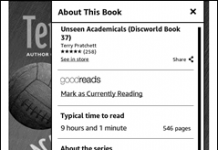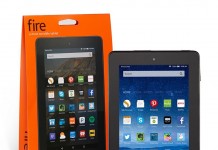Long-time open source developer and spam fighter Chip Rosenthal chose to crunch some numbers for his research of whether or not to buy a Kindle this holiday season. After doing the math, Chip describes in his blog how, over a three year period, using a Kindle would cost $565 more than simply buying paper books. He attributes the difference largely to what he calls the “DRM Tax”.
“[…] maybe someday Amazon (and publishers) will realize how much harm they are doing with DRM. If the DRM tax was removed, not only would more people get e-readers, but also, thanks to the low friction of e-book purchasing, they’d buy more e-content”
The logic is nothing that e-book followers haven’t heard before, but it’s interesting to see a dollar figure applied to the end-user cost of current methods of DRM …

































Your mileage may vary. In particular, I think the DRM tax is based on the assumption that there is zero probability that the books will be useful after the expected device lifetime…which, with Kindle for X (where X is an increasing set of products) is unlikely. Still, it’s interesting to see how anti-DRM many users are.
I hate DRM as much as the next user (and don’t use DRM as a publisher except where required by the process) but let’s not forget that we who oppose DRM should be ultra-scrupulous when it comes to respecting copyright and license limitations.
Rob Preece
Publisher
what i don’t quite get about drm, is what the problem is with just copy-protecting an entirely portable, non-device-specific file, and allowing the file to remain copyright protected, rather than controlled by a licensing agreement. static text content isn’t software. why can’t i just give or lend any electronic book i want, as long as when i do, i no longer have it in my possession? i love the convenience of e-reading (i’ve had a kindle since february); but i don’t care for the fact that i’ve lost right of first sale.
in view of this, i can say that drm is affecting my purchasing behavior. i already lost my paid copy of the glassbook edition of john saul’s ‘the right hand of evil’ before i could read it — in a computer upgrade. after that experience i simply know better than to pre-buy much content. with few exceptions, i pay as i go. i also only buy the kind of content that i would buy anyway, and wouldn’t cry too hard over losing — assuming i’d already read it (hugely long mass-market fiction, for example). i’d buy a lot more e-books if i had better assurance that i would be able to curate my electronic text purchases.
It may seem odd to other folk, but I keep track of ebooks bought and how much I paid vs MSRP. Since 4/18/2008 I’ve bought 167 Kindle compatible ebooks, assorted fiction and non-fiction, from Amazon and elsewhere. The MSRP would be $2,301.84, but actual cost was $690.64. Add in equipment: the Kindle 1 at $399 (now my wife’s) and the Kindle 2 at $299.00 (mine) for a total expenditure of $1388.46. That is a total savings (books+equipment) of $913.38 over the MSRP of the plain paper books.
OK, assume I go to a used bookstore to sell every book after I read it. (I don’t sale my books in reality, but assume I do.) I could at best get 10 to 15% cash back. Giving myself the best value for each and every book, I’ll get $345.28, which will cut down my savings to $568.10. OK, maybe I should go for trade credit at 25% MSRP in lieu of cash, for $575.46 in store credit. My savings are now $337.92. I would somehow have to finagle a 40% return on the MSRP for each and every book, then I’d be in the hole ($7.36) by using the Kindle.
Now if I used the sale price from Amazon in lieu of the MSRP, my savings do go down. The 167 books would have cost only $1808.64, so initial savings would only be $533.71. Not as good, but who really pays MSRP for books? Then I’d only have to recoup 25% of MSRP to be in the hole ($31.98).
Use and costs of ebooks will vary from person to person, of course, but I dare say it is possible to save quite a bit with the Kindle.
As for repurchasing ebooks due to a retired Kindle, I think the original estimates are way off. I’ve got a Dell Axim PDA that is about seven years old, still functioning if I wanted to fire up the old MS Reader program and read ebooks, so the 3 year life span of the Kindle might be on the low side. Unknown issues aside, let’s say 5 years. Also, ebooks can be read on up to six different Kindles. Since my wife and I share an account, it will be an estimated 15 years before we’d ever have to think about repurchasing a book due to a DRM tax. I’m assuming we get new Kindles roughly in tandem.
In the last 15 years I’ve had to purchase exactly one book from an unbridged audio cassette format to a digital format; that is the closest I can come to an actual (sort of) DRM tax issue. If that is the worst, then it is not all that bad.
And I understand that there are people who remove DRM from their Amazon purchases…
Greg M, I keep track of dollars spent versus books read to average out my cost per book, and even factoring in equipment, it comes out way cheaper than paper books. I have found that the free books subsidize the cost of the paid books (for example, when I took my English degree in university and we studied Wuthering Heights, I had to buy a paper copy; now, not so much!) I also am very careful to always buy on sale and take advantage of rebates and promo codes. So even leaving equipment and free books aside for a moment, just looking at money spent on books and how many books that got me, I am at about $3 a book. Definitely cheaper than paper!
To say that the original article in any way represents any experience other than the author’s totally-made-up hallucinations, is stretching the truth. He looks up books (technical books few others would want to buy) and then rather than taking the actual prices in comparison to paperbound, he just arbitrarily throws in a 10% lower price for the Kindle editions. He must then make other assumptions for his model. Any changes in this arbitrary model will totally change the outcome; in essence, he might have tweaked the assumptions and come up with a bigger ‘DRM tax’ or smaller, or none at all.
One other thing to note here is that he found that only the Amazon Kindle store had even 60% of the books on his list. That eliminated the other e-readers, so he buys (in his model) a Kindle, and then has to replace that Kindle at an arbitrary end-of-life. These two hardware costs are factored in.
But of course with the Kindle4PC program, he could buy a cheap netbook or slate, and get these Kindle edition books without purchasing any new hardware. He could also reinstall this Kindle4PC program on his new PCs (or other Kindle reading software for other gadgets he might now or in future own) without being specifically ‘locked in’ to the Amazon hardware device.
Not very helpful, all in all, and another example of why hypothetical models will never compare to real-world, ‘this is how much it cost me in my experience’ anecdotes.
To Asphalt:
It amazes me that more people don’t ask for what you describe. The IEEE is working on a “Standard for Consumer-ownable Digital Personal Property” which will make it possible to sell movies, songs, books, and games that aren’t tethered to any company and that remain singular, giftable, sellable, and sharable, just like your other personal property. We’ve just gotten started, so it will take a while to define and deploy Digital Personal Property (DPP), but once that’s done you WILL be able to own copyrighted works in digital form.